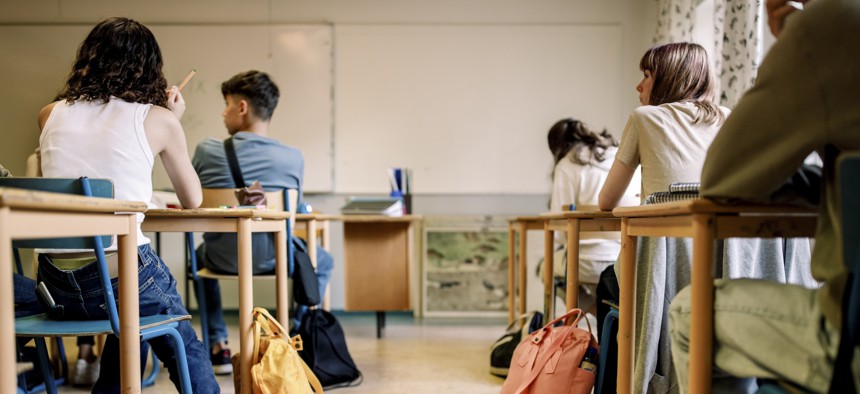Opinion: New York’s corporal punishment ban is crucial to kids’ mental health
As pandemic-related disruptive behaviors continue in schools, mental health supports are the answer.

Maskot - GETTY IMAGES
In June 2022, the Cassville school board located in Southwest Missouri approved a policy to bring back corporal punishment in its schools. This is a policy the district had abandoned more than 20 years ago but is likely resurfacing due to the increase in disruptive behaviors and other mental health problems, many of which may have arisen across the nation as a result of the COVID-19 pandemic. In New York state, where corporal punishment is banned in public schools, the Times Union recently reported that the New York Education Department documented close to 18,000 complaints of corporal punishment in public and charter schools, and from 2016 to 2021, 16,000 of those complaints were substantiated.
The Cassville’s school board policy and the reports of New York State school officials engaging in corporal punishment ignore the overwhelming scientific research: Children across cultures are harmed by corporal punishment – making it an ineffective means of discipline. To further this point, American Academy of Pediatrics and the American Psychological Association have recommended against the use of corporal punishment in schools.
At the New York Foundling and the National Initiative to End Corporal Punishment, we see an increasingly acute mental health crisis across the nation as a direct result of the pandemic. Schools nationwide are seeing an increase in disruptive behaviors, more verbal and physical fights and shorter tempers across the board. The Centers for Disease Control and Prevention released new data on adolescent behavior showing that more than one in three high school students experienced poor mental health during the pandemic and more than 50% of students experienced emotional abuse in the home. We believe the current mental health crisis can be understood in the context of increased stressors on children, parents and families that occurred during the pandemic – and is likely the reason for the Cassville school board decision to bring back corporal punishment in its schools.
It can be incredibly difficult to teach children, keep them safe and improve their behavior all while helping them reach their full academic potential. However, there are no known positive or prosocial effects of corporal punishment. In fact, there is compelling evidence that corporal punishment causes both physical and psychological injury and actually lowers children’s academic performance.
The American Psychological Association highlighted such negative outcomes in a report entitled, “Corporal Punishment Does Not Belong in Schools.” One study cited in the APA report found that 1 in 4 adolescents who were subjected to school corporal punishment reported injuries including bruises, cuts and broken bones. The APA report cites a study that showed “children who experience school corporal punishment report feeling angry, embarrassed and afraid.” Most significantly, years of research have shown that instead of reducing school disruptive behavior, children who experience corporal punishment actually become more disruptive and aggressive. Furthermore, the same APA report also offers evidence that shows that in 2018 a higher percentage of Black students and disabled students were subjected to corporal punishment in United States public schools.
In part due to these negative health, behavior and academic outcomes, 31 states have banned corporal punishment in public schools altogether including New York. APA’s report further notes that 91% of public schools in the United States choose not to use corporal punishment. Most promising is the national trend for U.S. public schools to use non-punitive measures that have been found to decrease disciplinary referrals.
Organizations like The New York Foundling offer model educational approaches to reduce trauma-related stress, anxiety and conflict with peers, while also balancing the need to enhance educational outcomes. This includes our school-based mental health program: Through satellite clinics and staffing school support teams, we assist a student population of about 4,000 at 11 K-12 schools across the Bronx, Manhattan and Queens. Our services don’t maintain a waitlist, so at our partner schools, a full-time clinician responds to every single request. These are high-need student populations who likely experienced trauma during the pandemic and thus may be at a higher risk for behavioral and social-emotional challenges. By providing added supports like this, we are able to help teachers and school administrators avoid last resort options such as corporal punishment.
Although the Cassville’s school board’s decision to bring back corporal punishment was likely motivated by a sincere need to do something about disruptive student behavior, scientific research has shown that, in fact, the opposite will likely occur. If educators and administrators continue to rely on corporal punishment, over time there will inevitably be an increase in student aggression and disruptive behavior, and these patterns will continue to negatively impact the lives of the students involved. Alternatively, if we invest in children’s social-emotional wellbeing, and address the real-time needs of educators, we can work to avoid these negative mental health outcomes.